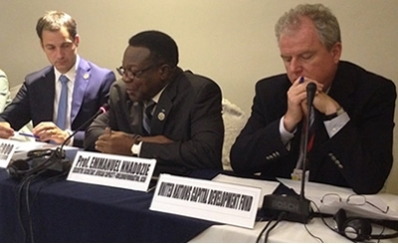
The lack of capacity remains a bottleneck for many an actor in Africa’s financial system and a multi-layer approach to capacity building is needed to foster financial inclusion on the continent, said the ACBF’s Executive Secretary, Prof. Emmanuel Nnadozie. He was speaking as a panellist at an African Development Bank (AfDB) event held yesterday in Addis Ababa, Ethiopia, on the sides of the 3rd Finance for Development. The event’s theme was “Advancing Financial Inclusion in Africa through Digital Finance Service”.
The other panelists at the side event were S.E. Mr. Alexander de Croo, Minister for Development Cooperation, Kingdom of Belgium; S.E Mr. Claver Gatete, Minister of Finance and Economic Planning, Rwanda; Mr Henri Dommel, Director, Financial Inclusion Practice Area, United Nations Capital Development Funds; Mr. Stefan Nalletamby, Director, Financial Sector Development Department, African Development Bank ; Mr. Danson Muchemi, CEO, JAMBOPAY; Professor Lemma Senbet, Executive Director, African Economic and Research Consortium, and; Elaine Weidman Grunewald, Vice President Sustainability & Corporate Responsibility, Ericsson.
“There is need for multi-layer capacity building efforts that target service providers so they customize their service according to customer group needs; change the mindset of customers on the role of financial intermediaries and enhance financial regulation capacity – principally targeting parliaments to empower them to pass compatible laws and allocate the required resources for advancing digital financial services,” Prof. Nnadozie said.
The Executive Secretary also underscored that regulators should keep abreast of market developments -and the different risks introduced thereby, adjust and upgrade their regulations and their supervisory policies and techniques with increasingly more complex financial products and technology.
Prof. Nnadozie suggested to the participants that work must be done in enhancing the capacity of Africa’s financial market infrastructure and establishing a financial market enabling environment.
Participants and panellists agreed that the different projects needed to facilitate change in financial markets toward inclusion should prioritize improving the scope and accuracy of information and its availability and accessibility to market actors so that they could better serve their function, and building the capacity of market actors - providers, consumers, regulators, etc. - to deliver services and/or engage in necessary or new activities.
In its 2014 Africa Capacity Report (ACR 2014), which is the Foundation’s annual flagship report, the ACBF underlined that 88 percent of the Regional Economic Communities had stated that fiscal policy and financial market development was their first priorities with regard to organizational capacity building. Advancing financial inclusion through digital financial services in Africa was recognized as one important aspect of achieving accelerated financial and economic development.
Digital financial services are important for at least three key reasons: economic growth, efficiency and market expansion; financial security and transparency; and ‘formalization’ of the shadow economy.
Digitalizing financial services can boost economic development through an enhancement of the national competitiveness and the creation of jobs in the various sectors.
Through digital financial services, African countries can improve the efficiency of making payments by increasing the speed of payments and by lowering the cost of disbursing and receiving them. While probably accelerating the uptake of existing products, the costs reduction can lead to significant market expansion.
The 3rd FFD conference has brought together representatives of Government, Ministers of Finance, Foreign Affairs and Development Cooperation, the Private Sector and other special representatives.
It is expected to address recent multilateral efforts to promote international development cooperation; the current evolving development cooperation landscape; the interrelationship of all sources of development finance; the synergies between financing objectives across the three dimensions of sustainable development; and the need to support the United Nations development agenda beyond 2015.





